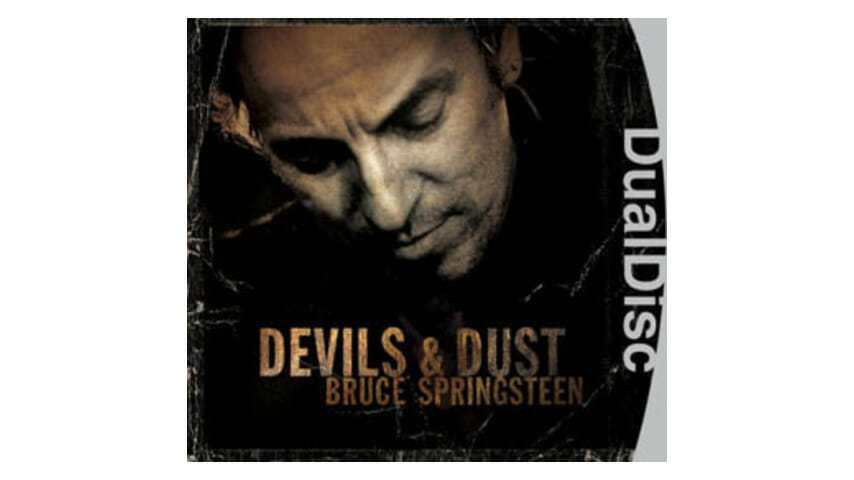Bruce Springsteen – Devils & Dust

After months of campaigning tirelessly for a Kerry/Edwards victory, praying hard over cold black coffee, lashing flags to guitar strings, wailing and riffing and huffing ’til his heart damn near burst, Bruce Springsteen spent the night of November 2 watching his hoped-for America disintegrate into a small, sad pile of—what else?—Devils & Dust.
The resulting record, Springsteen’s 19th, sees America’s reigning pop-folksinger regressing, searching frantically for a way to reclaim the country he (and John Kerry) unceremoniously lost last fall. And while Springsteen may be desperate to salvage the slab of land that’s been the spiritual and emotional nexus of almost every epic he’s penned, the jilted partner he’s skewered and re-romanced hundreds of times over the last three decades, the central question of Devils & Dust remains: Is it real?
Hookers in Reno, fields of blood and stone, last calls, homemade maps, kids cocooned in sleeping bags, silver palominos, blind men waving by the side of the road: Devils & Dust is a roadtrip through an America untouched by contemporary homogenization—anti-corporate and illusory, more like a Robert Frank photograph or a snippet from On the Road than anything from your own backyard.
Springsteen has a long, celebrated history of channeling personal defeat into indubitable fight songs, and Devils & Dust is Bruce at his best and worst—apologetic and disillusioned, brave and steadfast, disengaged and hopeful. Opener “Devils and Dust” spotlights Springsteen’s spare acoustic strums and gorgeously worn growls (think 1982’s impeccable Nebraska). Head down and hands in pockets, Bruce bellows staid Guthrie-like proclamations. It’s impossibly earnest, so sober you can hear the streaks of dirt on his Levi’s, feel the curl of his beard. Alone and unnerved, Springsteen bemoans the plight of a man without any viable options: “I’ve got my finger on the trigger,” he rumbles. “But I don’t know who to trust.”
-

-

-

-

-

-

-

-

-

-

-

-

-

-

-

-

-

-

-

-

-

-

-

-

-

-

-

-

-

-

-

-

-

-

-

-

-

-

-

-








































